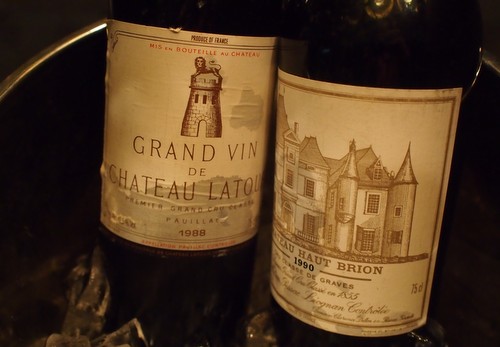
I always like Emile Peynaud’s quote about how expensive wines tasted blind frequently disappoint. Along similar lines, there’s the well known scientific experiment where subjects had their brains scanned while they were tasting the same wine, but being given different price information each time. They liked the wine more – and their brains responded differently – when they believed it to be expensive.
Judging wine blind is difficult. But judging wines sighted has its own problems. In particular, it’s really difficult to judge super-expensive wines sighted. The knowledge we have about their price gets in the way, and even changes out perception. We give the wine the benefit of the doubt, and can even see complexity, harmony and balance where there is none.
This is something that producers can take advantage of. They like to show their expensive wines at grand lunches in top restaurants, or at tutored one-on-ones with the winemaker. If I want to taste the top Champagnes, then I’ll likely have to do it at one of these occasions, and it certainly can skew things in favour of the wine. Penfolds are very clever in this regard: I think most of the times I have tasted current and older vintages of Grange have been in the presence of the talented, energetic Peter Gago, who acts as a winemaking ambassador for Penfolds’ Bin Series wines. They are also quite selective at showing off their new releases to on-message journalists in settings that they control. Like the top Champagne houses, Penfolds’ wines are now targeted clearly at the luxury goods marketplace. The first growth Bordeaux Chateaux won’t allow their wines to be tasted blind alongside all the others during the primeurs week: you have to go to them, if you are lucky enough to score an invite. No exceptions are made, even for publications whose normal behaviour is to taste blind.
Tasting old wines can also have a similar effect. It’s so hard to assess, objectively, great old vintages of top wines. In part, this has made things easier for fakers. Several high profile wine journalists – who regularly get invited to high ticket events where grand old wines are served – have fallen for fake wines. How is this possible? It is actually much easier to get it wrong when you assess super expensive bottles because you are psychologically primed to like the wine a great deal.
5 Comments on Why judging super-expensive wines is difficult


I see and hear this discussion all over and still don’t understand it. The problem is the whole idea of a wine “critic” in the first place. I would be happy to read any reasonably descriptive wine tasting note, but when a pro wine writer starts to “judge” the wine – I check out. I was trained by a master Somm that emphasized the importance of assessing the wine, NOT judging the wine. I didn’t agree with this early in my training, but I am now a complete convert. ASSESS the structure, texture, varietal integrity, freshness, complexity, length of finish and finally the most important – balance. If you emphasize the character of the wine, NOT the flavors and aromas, better quality wines will always rise to the surface. When tasting this way, even when not blind, it is much easier to be objective!
Very good piece Jamie. The opposite is also true when tasting inexpensive bottles from low prestige regions or producers.
So we should be taking your points with a pinch of salt (Katsuobushi) Or do you factor in the ‘fancy restaurant effect’?
I remember when in NZ once being given a syrah to try out of a fancy Riedel decanter; “try this, it’s superb” said my host with a smile. It was indeed extremely good, and I thought it must be a boutique effort from the Gimblett Gravels or suchlike. It was Jacob’s Creek… So there is also the effect of (a) a posh decanter and (b) being told by your host that you’re drinking something exceptional. And of course (c) thinking your critical ability is much better than it is!
My personal problem is that I cannot make any mental connection with the consumers of such wines. So it’s hard not only to taste, but even harder to report on very expensive wines. What should I write? “Haut-Brion is pretty expensive but you worked hard (hahaha) and you deserve it (hahaha)” when I can only imagine types like sheiks, oligarchs, bankers and similar as a “target group”